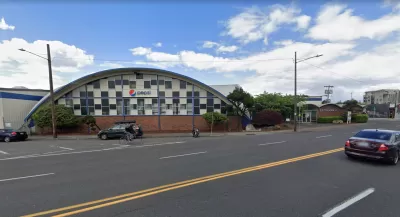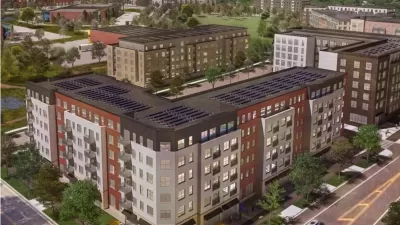A former industrial site on the edge of Portland, Oregon's urban core is planned with major urbanism ambitions.

Will Macht, a professor of urban planning and development at the Center for Real Estate at Portland State University, writes to describe a pioneering development process for a "live/work/make/eat/shop" superblock in Portland.
"Finding four-and-a-half city blocks, including the land formerly occupied by internal streets, only 1.5 miles (2.4 km) from downtown Portland, Oregon, gave Seattle-based Security Properties the opportunity to develop the first project using the city’s new planned development review entitlement process established for large sites of over two acres (0.8 ha)," writes Macht.
The development, called Pepsi Blocks for its location at the former site of a Pepsi bottling plant, is planned to total 1.2 million square feet of space, comprising "up to 1,130 residential units, 450,000 square feet (42,000 sq m) of offices, and 30,000 square feet (2,800 sq m) of retail shops."
There's a lot more detail to the urbanism ambition of the development—like a shared street, or woonerf, on Pacific Street where it cuts through the development.
FULL STORY: Bringing Mixed Uses—and Open Space—to a Multiple-Small-Block Development in Portland

Maui's Vacation Rental Debate Turns Ugly
Verbal attacks, misinformation campaigns and fistfights plague a high-stakes debate to convert thousands of vacation rentals into long-term housing.

Planetizen Federal Action Tracker
A weekly monitor of how Trump’s orders and actions are impacting planners and planning in America.

In Urban Planning, AI Prompting Could be the New Design Thinking
Creativity has long been key to great urban design. What if we see AI as our new creative partner?

King County Supportive Housing Program Offers Hope for Unhoused Residents
The county is taking a ‘Housing First’ approach that prioritizes getting people into housing, then offering wraparound supportive services.

Researchers Use AI to Get Clearer Picture of US Housing
Analysts are using artificial intelligence to supercharge their research by allowing them to comb through data faster. Though these AI tools can be error prone, they save time and housing researchers are optimistic about the future.

Making Shared Micromobility More Inclusive
Cities and shared mobility system operators can do more to include people with disabilities in planning and operations, per a new report.
Urban Design for Planners 1: Software Tools
This six-course series explores essential urban design concepts using open source software and equips planners with the tools they need to participate fully in the urban design process.
Planning for Universal Design
Learn the tools for implementing Universal Design in planning regulations.
planning NEXT
Appalachian Highlands Housing Partners
Mpact (founded as Rail~Volution)
City of Camden Redevelopment Agency
City of Astoria
City of Portland
City of Laramie





























